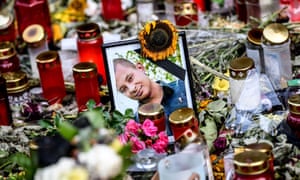⇩ Use your ears. Click below to hear this post.
|
|
Packing away her metal trays of breads and biscuits in Chemnitz’s Peukert bakery, famous for its century-old recipes, the shop assistant says she is glad it is closing time. Outside, police and protesters are gathering ahead of the latest far-right rally. “We’ve been here before,” she says, pulling down the window blinds and shrugging, saying that the insurers will pay for any damage. “Thirty years ago we also had to tell the state what’s what.”
“It’s just like way back then,” the woman, who declined to give her name, says of the 1989 protests that brought down the communist German Democratic Republic (GDR). “It feels like no one really listens to us ordinary folk, which is why people are on the streets again.”
Chemnitz, in the east German state of Saxony, has been the stage for far-right protests since the murder last Sunday of a 35-year-old man, for which an Iraqi and a Syrian man are being held in custody. The violent demonstrations made headlines around the world and are quickly earning the city a reputation as a neo-Nazi stronghold in which foreigners are not welcome.

Some in the town dispute that. “We’re not, we’re just against anyone who is a threat to our lives and livelihoods and we’re afraid,” says a 70-year-old retired bus driver, standing on the fringes of the demonstration, who also declines to be identified. Protesters chant: “Wir sind das Volk [we are the people],” just as they did in the dying days of the communist regime. Repeated attempts to talk to those in the thick of it fail. “We don’t talk to the Lügenpresse [lying press],”, is a typical response.
Schmidt blames Alternative für Deutschland, (AfD), the anti-immigrant party that has done better in Saxony than in any other region. According to recent polls, it has the support of a quarter of the population. “They have made voicing anti-foreigner hatred socially acceptable,” she says.
“I’m used to the neo-Nazis,” she says, “but not seeing my neighbour or the plumber mixing with them in broad daylight. You can’t rule out anyone being here.” It’s a development, she says, that has taken place over the past three years, since Angela Merkel sanctioned the arrival of more than 1 million refugees.
The protests, which saw neo-Nazis deploy illegal Hitler arm salutes, culminated on the first night in mobs of rightwing extremists breaking off and searching for foreigners to beat up, in scenes that have been compared to the Nazi pogroms of the 1930s.
On Friday, in a development that risks fuelling further outrage, a court said one of the stabbing suspects could have been deported two years ago to Bulgaria, where he first applied for asylum, but authorities missed a six-month deadline for doing so.
Yusef, a 56-year-old Moroccan at a shisha bar not far from where Daniel H’s murder took place, is reluctant to talk about recent events. He will not give his surname. But he admits: “I’m scared for my wife and children and grandchildren, if I’m honest. The mood tipped at the weekend. I locked up my shop, but I worry the police won’t manage to keep the mobs at bay next time.” He says he came to Germany 23 years ago and has rarely experienced a mood as hostile.
Police, who were initially severely outnumbered by the estimated 6,000 rightwing extremists from across Germany, are out in force. Officers have been bussed in from five German states to police the latest demonstration – attended by around 2,000 – and a town hall meeting being hosted simultaneously just metres away by Michael Kretschmer, the premier of Saxony, at which ordinary citizens have been been invited to voice their concerns.
“I’m hoping we will get some concrete suggestions from the politicians as to how to solve the problems with our lack of security,” says Daniel Schmidt, 20, a trainee geriatric nurse. “I think it would help if Germany stopped spending so much money on foreigners – for instance, propping up the Greek economy, then inviting refugees here – and used it to help Germans instead.”
His friend, Susane Kardos, 19, a sales assistant, says Chemnitz has become intolerably unsafe since the refugees began arriving in 2015, and she is “unable to walk down the street without some non-German bloke talking to me in an offensive way”. The consequence is, she says, she no longer goes out in the evenings.
Both are angry that Chemnitz has been labelled “Nazi”. “People are just scared,” says Schmidt, referring to the negative publicity as Saxon bashing. “I don’t want to stand next to someone giving the Nazi salute, but I have a right to demonstrate too.”
At the meeting, in the local football stadium, Kretschmer, a member of Merkel’s Christian Democrats – who have ruled in Saxony since German reunification in 1990, but are seeing that power base erode – calls for a minute’s silence in memory of Daniel H, which is followed by applause.
“I’ve met so many people this week who say we Chemnitzers are not rightwing extremists as many seem to believe, and I certainly know that’s the case,” he says, to cheers. “But I urge you to distance yourselves from the extremists. And we have to find a way of working together.” Some in the audience boo.
The mayor, Barbara Ludwig, a Social Democrat, also draws boos as she talks of a right to protest that “we fought for” as GDR citizens but does not mean the right to “hunt down those who are different to us”. She warns of the consequences to the university town’s economy “if people stop coming here because they are scared to go on to the streets”.
When she says that there can never be 100% security, there are shouts of anger. “It would help if you didn’t let in those knife-wielding foreigners,” says one man.

“Schlimm [terrible]”, says one elderly man, leaning in to read the messages of condolence people have left behind. “You will not have died in vain,” reads one message. Another states: “We Germans will finish them off.”
The family of Daniel H has expressed its dismay that his death has been used by the far right to mobilise support, not least because, being a German-Cuban, he had himself faced considerable racism in his lifetime.
“These rightwingers,” one of his school friends has written on his Facebook page, “are the very people we had to fight against when we were younger because we didn’t look German enough to them.”
see source